| Listing 1 - 10 of 69 | << page >> |
Sort by
|
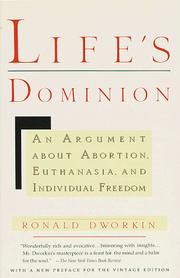
ISBN: 0679733191 9780679733195 Year: 1994 Publisher: New York (N.Y.): Vintage books,
Abstract | Keywords | Export | Availability | Bookmark
 Loading...
Loading...Choose an application
- Reference Manager
- EndNote
- RefWorks (Direct export to RefWorks)
Legal theory and methods. Philosophy of law --- Ethics of family. Ethics of sexuality --- 173.4 --- 343.62 --- Abortion --- -Abortion --- Euthanasia --- Human rights --- -Assisted death (Euthanasia) --- Assisted dying (Euthanasia) --- Death, Assisted (Euthanasia) --- Death, Mercy --- Dying, Assisted (Euthanasia) --- Killing, Mercy --- Mercy death --- Mercy killing --- Homicide --- Medical ethics --- Assisted suicide --- Right to die --- Basic rights --- Civil rights (International law) --- Rights, Human --- Rights of man --- Human security --- Transitional justice --- Truth commissions --- Abortion, Induced --- Feticide --- Foeticide --- Induced abortion --- Pregnancy termination --- Termination of pregnancy --- Birth control --- Fetal death --- Obstetrics --- Reproductive rights --- Abortus provocatus. Contraceptie. Kunstmatige inseminatie. Proefbuisbaby's --- Delicten tegen hulpbehoevenden en minderjarigen. Illegale abortus --- Law and legislation --- -Law and legislation --- Surgery --- -Abortus provocatus. Contraceptie. Kunstmatige inseminatie. Proefbuisbaby's --- -173.4 --- 343.62 Delicten tegen hulpbehoevenden en minderjarigen. Illegale abortus --- 173.4 Abortus provocatus. Contraceptie. Kunstmatige inseminatie. Proefbuisbaby's --- -Basic rights --- Assisted death (Euthanasia) --- Abortion. --- Euthanasia. --- Human rights. --- Avortement --- Euthanasie --- Avortement. --- Euthanasie. --- Droits de l'homme (Droit international). --- Abortus provocatus. --- Wetgeving. --- Grondrechten. --- Abortion, Induced. --- Human Rights. --- Droit --- Law and legislation. --- United States.
Book
ISBN: 9780674046719 0674046714 0674059336 0674071964 0674072251 9780674072251 Year: 2011 Publisher: Cambridge (Mass.): Belknap press of Harvard university press,
Abstract | Keywords | Export | Availability | Bookmark
 Loading...
Loading...Choose an application
- Reference Manager
- EndNote
- RefWorks (Direct export to RefWorks)
The fox knows many things, the Greeks said, but the hedgehog knows one big thing. In his most comprehensive work the author argues that value in all its forms is one big thing: that what truth is, life means, morality requires, and justice demands are different aspects of the same large question. He develops original theories on a great variety of issues very rarely considered in the same book: moral skepticism, literary, artistic, and historical interpretation, free will, ancient moral theory, being good and living well, liberty, equality, and law among many other topics. What we think about any one of these must stand up, eventually, to any argument we find compelling about the rest. Skepticism in all its forms, philosophical, cynical, or post-modern, threatens that unity. The Galilean revolution once made the theological world of value safe for science. But the new republic gradually became a new empire: the modern philosophers inflated the methods of physics into a totalitarian theory of everything. They invaded and occupied all the honorifics, reality, truth, fact, ground, meaning, knowledge, and being, and dictated the terms on which other bodies of thought might aspire to them, and skepticism has been the inevitable result. The author feels we need a new revolution, and that we must make the world of science safe for value.
General ethics --- Legal theory and methods. Philosophy of law --- Values --- Ethics --- Ethics. --- Values. --- Axiology --- Worth --- Aesthetics --- Knowledge, Theory of --- Metaphysics --- Psychology --- Deontology --- Ethics, Primitive --- Ethology --- Moral philosophy --- Morality --- Morals --- Philosophy, Moral --- Science, Moral --- Philosophy --- Morale --- Valeurs sociales
Book
ISBN: 9780674726826 0674726820 Year: 2013 Publisher: Cambridge (Mass.): Harvard university press,
Abstract | Keywords | Export | Availability | Bookmark
 Loading...
Loading...Choose an application
- Reference Manager
- EndNote
- RefWorks (Direct export to RefWorks)
In his last book, Ronald Dworkin addresses questions that men and women have asked through the ages: What is religion and what is God's place in it? What is death and what is immortality? Based on the 2011 Einstein Lectures, Religion without God is inspired by remarks Einstein made that if religion consists of awe toward mysteries which "manifest themselves in the highest wisdom and the most radiant beauty, and which our dull faculties can comprehend only in the most primitive forms," then, he, Einstein, was a religious person. Dworkin joins Einstein's sense of cosmic mystery and beauty to the claim that value is objective, independent of mind, and immanent in the world. He rejects the metaphysics of naturalism--that nothing is real except what can be studied by the natural sciences. Belief in God is one manifestation of this deeper worldview, but not the only one. The conviction that God underwrites value presupposes a prior commitment to the independent reality of that value--a commitment that is available to nonbelievers as well. So theists share a commitment with some atheists that is more fundamental than what divides them. Freedom of religion should flow not from a respect for belief in God but from the right to ethical independence. Dworkin hoped that this short book would contribute to rational conversation and the softening of religious fear and hatred. Religion without God is the work of a humanist who recognized both the possibilities and limitations of humanity.
Religious studies --- Religion --- -291.1 --- Atheism. --- Freedom of religion. --- Freedom of religion --- Freedom of worship --- Intolerance --- Liberty of religion --- Religious freedom --- Religious liberty --- Separation of church and state --- Freedom of expression --- Liberty --- Philosophy --- Agnosticism --- Free thought --- Irreligion --- Secularism --- Theism --- Religion, Primitive --- Atheism --- God --- Religions --- Theology --- Philosophy. --- Godsdienstfilosofie --- Law and legislation --- Atheismus. --- Religionsphilosophie. --- Religionsfreiheit. --- Religionsfilosofi. --- Ateism. --- Religionsfrihet. --- 291.1 Godsdienstfilosofie --- 291.1
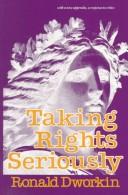
ISBN: 0674867106 9780674867109 Year: 1977 Publisher: Cambridge (Mass.): Harvard university press,
Abstract | Keywords | Export | Availability | Bookmark
 Loading...
Loading...Choose an application
- Reference Manager
- EndNote
- RefWorks (Direct export to RefWorks)
Law of civil procedure --- Legal theory and methods. Philosophy of law --- Political rights --- Legal positivism --- Jurisprudence --- Law --- Philosophy --- -Legal positivism --- Civic rights --- Civil rights --- Citizenship --- Legal neopositivism --- Neopositivism in law --- Positivism --- Acts, Legislative --- Enactments, Legislative --- Laws (Statutes) --- Legislative acts --- Legislative enactments --- Legislation --- Law and legislation --- -Philosophy --- Anglo-American law --- Law, Anglo-American --- Law - United States --- Law - Philosophy

ISBN: 0674554612 0674554604 9780674554610 9780674554603 Year: 1985 Publisher: Cambridge (Mass.): Harvard university press,
Abstract | Keywords | Export | Availability | Bookmark
 Loading...
Loading...Choose an application
- Reference Manager
- EndNote
- RefWorks (Direct export to RefWorks)
Legal theory and methods. Philosophy of law --- Political questions and judicial power --- Law --- Jurisprudence --- Droit --- Droits de l'homme --- Libéralisme --- Politique et pouvoir judiciaire --- Philosophy --- Political aspects --- Philosophie --- Aspect politique --- Interpretation --- 130.2:316 --- 340 <73> --- Law and politics --- -Judicial activism --- Judicial power and political questions --- Act of state --- Administrative discretion --- Judicial review --- Jurisdiction --- Rule of law --- Separation of powers --- Filosofie van de cultuur. Cultuurfilosofie. Cultuursystemen. Kultuurfilosofie-:-Sociologie --(algemeen) --- Rechtsbeginselen. Juridische methodologie.--Verenigde Staten van Amerika. VSA. USA --- -Philosophy --- Jurisprudence. --- Philosophy. --- Political aspects. --- 340 <73> Rechtsbeginselen. Juridische methodologie.--Verenigde Staten van Amerika. VSA. USA --- 130.2:316 Filosofie van de cultuur. Cultuurfilosofie. Cultuursystemen. Kultuurfilosofie-:-Sociologie --(algemeen) --- -Filosofie van de cultuur. Cultuurfilosofie. Cultuursystemen. Kultuurfilosofie-:-Sociologie --(algemeen) --- -Act of state --- Judicial activism --- -Law and politics --- Political science --- Droit et politique --- Science politique
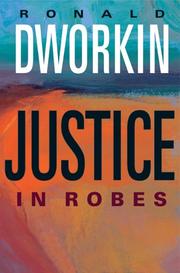
ISBN: 0674021673 9780674021679 0674027272 067426911X 9780674027275 Year: 2006 Publisher: Cambridge (Mass.): Belknap press of Harvard university press,
Abstract | Keywords | Export | Availability | Bookmark
 Loading...
Loading...Choose an application
- Reference Manager
- EndNote
- RefWorks (Direct export to RefWorks)
Droit et morale --- Droit et éthique --- Injustice --- Jurisprudence --- Justice --- Justice (morale) --- Law and ethics --- Recht en ethiek --- Recht en moraal --- Rechtswetenschap --- Rechtvaardigheid --- Science juridique --- Judicial process --- Law --- Law and ethics. --- Jurisprudence. --- Philosophy. --- Interpretation and construction. --- Analogy (Law) --- Construction and interpretation (Law) --- Construction and interpretation of statutes --- Interpretation and construction (Law) --- Statutes --- Statutory construction --- Judicial discretion --- Legal certainty --- Ethics and law --- Law and morals --- Morals and law --- Conduct of life --- Common good --- Fairness --- Decision making, Judicial --- Judicial behavior --- Judicial decision making --- Judges --- Procedure (Law) --- Philosophy --- Interpretation and construction --- Construction --- Psychological aspects --- Judicial process - Philosophy. --- Law - Interpretation and construction. --- Justice.
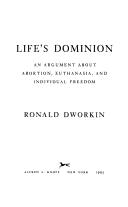
ISBN: 0394589416 Year: 1993 Publisher: New York : Knopf,
Abstract | Keywords | Export | Availability | Bookmark
 Loading...
Loading...Choose an application
- Reference Manager
- EndNote
- RefWorks (Direct export to RefWorks)
This book inquests into why abortion and euthanasia provoke such controversy. Do these acts violate some fundamental "right to life"? Or are the objections against them based on the belief that human life is sacred?
Abortion --- Euthanasia --- Human rights --- Avortement --- Euthanasie --- Droits de l'homme (Droit international) --- Law and legislation --- Droit --- -Euthanasia --- -Human rights --- #GBIB:CBMER --- 173.4 --- 179.7 --- 342.72 <73> --- 343.61 <73> --- 343.62 <73> --- Basic rights --- Civil rights (International law) --- Rights, Human --- Rights of man --- Human security --- Transitional justice --- Truth commissions --- Assisted death (Euthanasia) --- Assisted dying (Euthanasia) --- Death, Assisted (Euthanasia) --- Death, Mercy --- Dying, Assisted (Euthanasia) --- Killing, Mercy --- Mercy death --- Mercy killing --- Homicide --- Medical ethics --- Assisted suicide --- Right to die --- Abortion, Induced --- Feticide --- Foeticide --- Induced abortion --- Pregnancy termination --- Termination of pregnancy --- Birth control --- Fetal death --- Obstetrics --- Reproductive rights --- -Law and legislation --- Surgery --- Abortion. --- Euthanasia. --- Human rights. --- -Abortion --- Moral and ethical aspects.
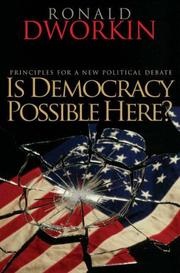
ISBN: 0691126534 9780691126531 0691138729 1282086901 1400827272 9786612086908 9780691138725 Year: 2006 Publisher: Princeton (N.J.): Princeton university press,
Abstract | Keywords | Export | Availability | Bookmark
 Loading...
Loading...Choose an application
- Reference Manager
- EndNote
- RefWorks (Direct export to RefWorks)
Politics in America are polarized and trivialized, perhaps as never before. In Congress, the media, and academic debate, opponents from right and left, the Red and the Blue, struggle against one another as if politics were contact sports played to the shouts of cheerleaders. The result, Ronald Dworkin writes, is a deeply depressing political culture, as ill equipped for the perennial challenge of achieving social justice as for the emerging threats of terrorism. Can the hope for change be realized? Dworkin, one the world’s leading legal and political philosophers, identifies and defends core principles of personal and political morality that all citizens can share. He shows that recognizing such shared principles can make substantial political argument possible and help replace contempt with mutual respect. Only then can the full promise of democracy be realized in America and elsewhere. Dworkin lays out two core principles that citizens should share: first, that each human life is intrinsically and equally valuable and, second, that each person has an inalienable personal responsibility for identifying and realizing value in his or her own life. He then shows what fidelity to these principles would mean for human rights, the place of religion in public life, economic justice, and the character and value of democracy. Dworkin argues that liberal conclusions flow most naturally from these principles. Properly understood, they collide with the ambitions of religious conservatives, contemporary American tax and social policy, and much of the War on Terror. But his more basic aim is to convince Americans of all political stripes — as well as citizens of other nations with similar cultures — that they can and must defend their own convictions through their own interpretations of these shared values.
Political participation --- Political culture --- Democracy --- Church and state --- Terrorism --- Social justice --- Participation politique --- Culture politique --- Démocratie --- Eglise et Etat --- Terrorisme --- Justice sociale --- Citizen participation. --- Participation des citoyens --- United States --- Etats-Unis --- Politics and government --- Politique et gouvernement --- Démocratie --- Self-government --- Political science --- Equality --- Representative government and representation --- Republics --- Citizen participation --- Political participation - United States. --- Political culture - United States. --- Democracy - United States - Citizen participation. --- Church and state - United States. --- Terrorism - United States. --- Social justice - United States. --- United States - Politics and government - 1989 --- -Political participation --- -Church and state

ISBN: 1841130419 Year: 1998 Publisher: Oxford : Hart Publishing,
Abstract | Keywords | Export | Availability | Bookmark
 Loading...
Loading...Choose an application
- Reference Manager
- EndNote
- RefWorks (Direct export to RefWorks)

ISBN: 0715607154 0715611747 9780715611746 9780715607152 Year: 1978 Publisher: London: Duckworth,
Abstract | Keywords | Export | Availability | Bookmark
 Loading...
Loading...Choose an application
- Reference Manager
- EndNote
- RefWorks (Direct export to RefWorks)
Qu’est-ce que la loi ? À quoi sert-elle ? Comment les juges devraient-ils trancher des affaires nouvelles lorsque les lois et les décisions antérieures n’apportent aucune réponse claire ? Les juges inventent-ils de nouvelles lois dans de telles affaires, ou existe-t-il une loi supérieure dans laquelle ils découvrent la bonne réponse ? Tout le monde doit-il toujours obéir à la loi ? Sinon, quand un citoyen est-il moralement libre de désobéir ? Un philosophe de renom entre dans le débat autour de ces questions. Clairement et avec force, Ronald Dworkin s’oppose à la théorie de la « règle » du droit anglo-américain – le positivisme juridique et l’utilitarisme économique – et affirme que les individus ont des droits légaux au-delà de ceux explicitement énoncés et qu’ils ont des droits politiques et moraux contre l’État qui sont prioritaires sur le bien-être de la majorité.
Political rights --- Jurisprudence --- Law --- Legal positivism --- 342.7 <41> --- Grondwettelijke rechten en vrijheden. Fundamentele rechten--Verenigd Koninkrijk van Groot-Brittannië en Noord-Ierland --- 342.7 <41> Grondwettelijke rechten en vrijheden. Fundamentele rechten--Verenigd Koninkrijk van Groot-Brittannië en Noord-Ierland --- Legal positivism. --- Political rights. --- Civic rights --- Civil rights --- Citizenship --- Legal neopositivism --- Neopositivism in law --- Positivism --- Anglo-American law --- Law, Anglo-American --- Philosophy --- Law and legislation --- Jurisprudence. --- Philosophy. --- Law - United States --- Law - Philosophy
| Listing 1 - 10 of 69 | << page >> |
Sort by
|

 Search
Search Feedback
Feedback About UniCat
About UniCat  Help
Help News
News